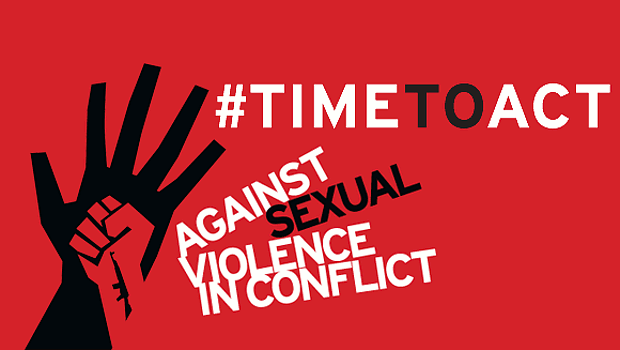Throughout history, sexual violence has been tragically prevalent in armed conflict, and often viewed as an unavoidable consequence of warfare. Its preponderance in armed conflict is dismaying. Sexual violence is a conspicuous phenomenon and a common thread in conflict dating back centuries. They are infinitely tangled. And it is tacitly accepted as unavoidable. Conflicts often exacerbate and escalate sexual violence. It is organized. It is endemic. It is barbaric. It is vertigo-inducing. It is a pestilence that inherently bedevils the conflicts for donkey’s years. It is a menace that has that has continued to challenge the conscience of humanity – especially in our times. It is a crime that destroys the dignity of individuals and tears apart the fabric of communities; a crime that has been carried out for generations with jerky abandon and with shocking levels of nonchalance. Sexual violence has been documented in long-simmering armed conflicts including those in Bosnia (former Yugoslavia), Peru, Bangladesh, Rwanda, the Democratic Republic of Congo, Liberia, Somalia and Syria. Despite widespread international attention and condemnation, sexual violence in armed conflict remains pervasive and the task to root it out has become more onerous and pronged.
While the history of wars and conflicts is replete with massive and systematic incidents of sexual violence against vulnerable girls and women, modern-day wars have witnessed large-scale indiscriminate deployment of rape as a ‘weapon’ of war by warring factions. Both the factions visit unconscionable levels of grisly violations upon civilians. They target civilians in a brainless spiral of violence that only ends up making the lives of civilians much more miserable than it already is.
Conflict increases the vulnerability of women and girls to sexual exploitation not only by combatants, but also by those responsible for protecting and caring for them – peacekeepers, humanitarian aid workers, and staffs working in the camps. They extort sexual favors in exchange for something to which the victim should be entitled to. Sadly, there is overt evidence not only that such situation occurs, but that it is widespread, under-reported and rarely prosecuted.
Sexual violence persists as a devastating phenomenon with damaging and detrimental consequences for victims as well as their families and whole communities. It is not confined to African or European conflicts, or to conflicts in developing or developed nations, but is a global scourge. Additionally, such violations remain vastly under-reported, and underestimated in terms of prevalence and consequences. The humanitarian response to the diverse needs of victims remains insufficient.
Girls and women are often the targets for sexual violence in armed conflict when rape and other forms of sexual abuse and assault are used as deliberate strategies of war. According to UN Action against Sexual Violence in Conflict, the vast majority of casualties in today’s wars are among civilians, mostly women and children. Sexual violence in conflict situations is as much a terrifying crime as a brutal one, wherever it takes place; it has direct and indirect effects on human lives, leaving deep, indelible scars on the victims as well as society itself. Sexual violence permeates the everyday lives of women in conflict. It is inherently humiliating. It is a quintessential violation of individual autonomy that removes an individual’s control over their body. The humiliation are particularly deep-seated.
Despite the fact that it is so widespread, sexual violence has been vastly under reported and the victims have suffered in silence. Because of the shame and the stigma involved, many victims have chosen to remain mum and the atrocities meted out on them are cloaked in silence. The few that are brave enough to come forward are branded as liars. There are cases of women in various countries, who have been forced to marry their abusers (including soldiers) to save them and their families from shame. Women survivors are ostracized from their families and communities, making them more isolated and vulnerable to further abuse. Yet of extreme concern, the perpetrators remain at large.
There are many reasons for sexual violence in conflict. Rape committed during conflict is often intended to terrorize civilians and subdue communities. For humiliation. Sometimes it’s used to glean information about rival groups to retaliate or exert power. It can also be used as a perk for soldiers to motivate them and as an inducement to courage on the battlefield. It erodes the fabric of a community in a way that few weapons can. As they say, rape is an incredibly effective- and cheaper weapon. Cheaper than bullets, and more destructive in many cases. Rape, and the threat to use it against women is one of the most potent and systematic tools employed to terrify civilians.
Many women who become pregnant as a consequence of rape may attempt to induce abortion, often at the detriment of their own health. Women who conceive as a result of rape may not seek pre- or ante-natal care, and children they deliver are often neglected, abused, stigmatized, ostracized or even killed.

June 19, is International Day for the Elimination of Sexual Violence in Conflict. The day offers a chance to raise awareness of the need to put and end to conflict-related sexual violence, to honor the victims and survivors of sexual violence around the world and to pay tribute to all those who have courageously devoted their lives and lost their lives in standing up for the eradication of these crimes.
Let’s collectively condemn the sexual violence. We must stop stigmatizing victims and must make their rights and safety the main priority. Let’s put the blame where it belongs, on the rapist and the cultures that endorse it. Let’s not just fight it, let’s also fight the conniving mendacity that allows cruelty to reign. It is a despicable system that only thrives because people are silent about it. Education alone isn’t enough to stop sexual violence in conflicts. That requires society as a whole to condemn and the international community to act.







